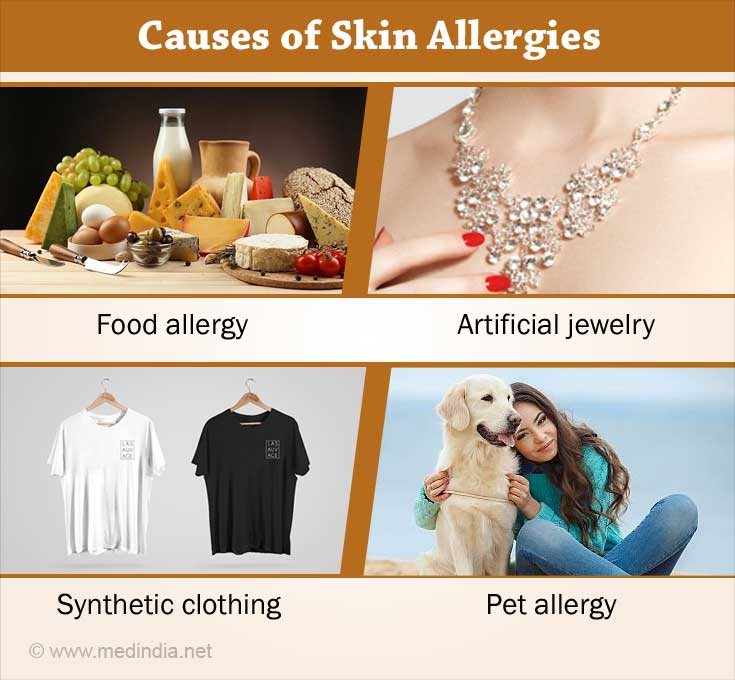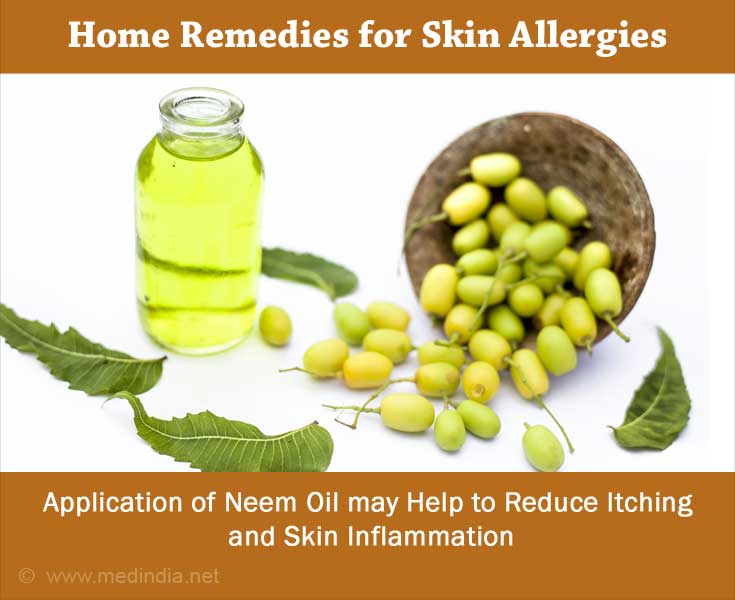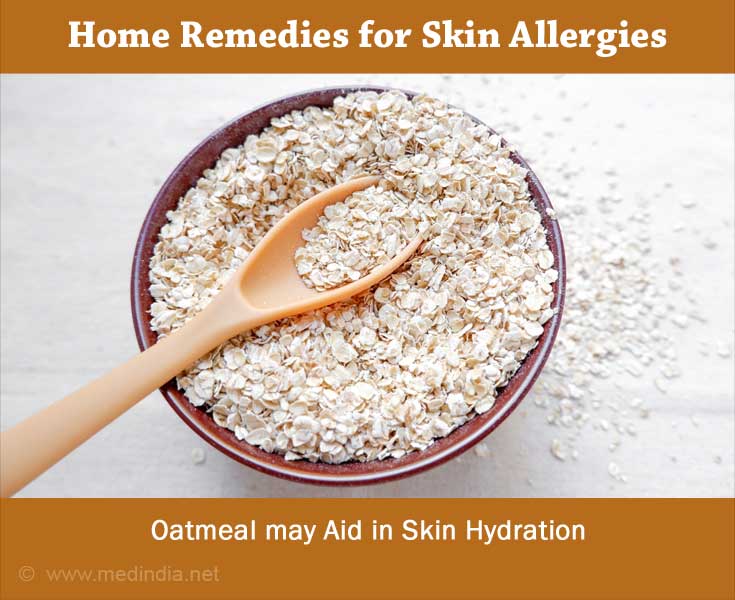- Allergy and the skin - (https://www.ncbi.nlm.nih.gov/pmc/articles/PMC2515356/)
- Diet and Dermatitis: Food Triggers - (https://www.ncbi.nlm.nih.gov/pmc/articles/PMC3970830/)
- Hypersensitivity reactions to food and drug additives: problem or myth? - (https://www.ncbi.nlm.nih.gov/pmc/articles/PMC6502174/)
- Nickel Allergy - (https://www.ncbi.nlm.nih.gov/books/NBK557638/)
- Fabrics for atopic dermatitis - (https://pubmed.ncbi.nlm.nih.gov/18512638/)
- Consensus document on dog and cat allergy - (https://pubmed.ncbi.nlm.nih.gov/29318625/)
- In vitro anti-inflammatory and skin protective properties of Virgin coconut oil - (https://www.ncbi.nlm.nih.gov/pmc/articles/PMC6335493/)
- Honey: A Therapeutic Agent for Disorders of the Skin - (https://www.ncbi.nlm.nih.gov/pmc/articles/PMC5661189/)
- Clinical and mycological benefits of topical application of honey, olive oil and beeswax in diaper dermatitis - (https://pubmed.ncbi.nlm.nih.gov/15679495/)
- Colloidal Oatmeal (Avena Sativa) Improves Skin Barrier Through Multi-Therapy Activity - (https://pubmed.ncbi.nlm.nih.gov/27272074/)
- Tulsi - Ocimum sanctum: A herb for all reasons - (https://www.ncbi.nlm.nih.gov/pmc/articles/PMC4296439/)
- An Insight into the Dermatological Applications of Neem: A Review on Traditional and Modern Aspect - (https://pubmed.ncbi.nlm.nih.gov/34961431/)
- Cooling the Itch via TRPM8 - (https://www.ncbi.nlm.nih.gov/pmc/articles/PMC6301073/)
What are Skin Allergies?
Skin allergies are one of the most common medical conditions. Skin allergies occur when a person’s immune system overreacts to a particular substance, that is harmless to most people. The substances which cause such reaction are called allergens and the response of the skin to an allergen is known as Allergic Skin Reaction. This reaction is due to certain antibodies IgE, which are produced by the body in response to the allergen. The common signs of skin allergies include dryness, flaking, redness, itchiness, rash and swelling. There may also be itchy raised bumps, which look like ant bites. The allergic skin conditions include Eczema [Atopic Dermatitis], Contact Dermatitis, Hives [Urticaria] and Angioedema.
What Causes Skin Allergies?
Skin allergies can be triggered by any of the following factors
- Food such as peanuts, nuts, cow's milk, seafood, eggs (2✔ ✔Trusted Source
Diet and Dermatitis: Food Triggers
Go to source). - Food additives - Butylated hydroxy toluene (BHT) and butylated hydroxyanisole (BHA), which are added to many breakfast cereals, breads to preserve their color, odor and flavor may cause skin swelling, redness, hives and severe itching. Sulphites, commonly used in the production of processed foods and beverages, wine, dried fruits, jams and jellies are known to cause itching and
skin rash (3✔ ✔Trusted Source
Hypersensitivity reactions to food and drug additives: problem or myth?
Go to source). - Nickel - This metal is frequently used in artificial jewelry, bra hooks or buttons on clothing and often causes skin allergies (4✔ ✔Trusted Source
Nickel Allergy
Go to source). - Fragrances used in beauty products, deodorant, soap, detergents.
- Plants such as poison ivy, stinging nettle, ficus.
- Synthetic clothing and dyes used in clothing (5✔ ✔Trusted Source
Fabrics for atopic dermatitis
Go to source). - Furry pets, saliva or urine of pets such as cats and dogs (6✔ ✔Trusted Source
Consensus document on dog and cat allergy
Go to source). - Contact with rubber, elastic, vinyl or latex.
- Antiseptic creams containing chlorhexidine [found in mouthwash, toothpaste, eye drops, eczema creams], neomycin sulphate.
- Insect bites of wasps and bees.

Disclaimer: The home remedies suggested here are not a substitute for treatment by doctors. It is highly advisable to seek an expert’s opinion. All the remedies listed here may not be suitable for everyone. It is recommended to check for allergies or do a patch test before using the remedy.
Top 10 Home Remedies for Skin Allergies
1. Coconut Oil: It is a popular choice to soften skin, reduce dryness and flaking and itching of skin. Coconut oil reduces inflammation and supports healing of the skin. The Vitamin E, Vitamin K and medium chain fatty acids in coconut oil are key ingredients, which penetrate the skin and help in moisturizing and treating skin conditions. It can be used directly or mixed with equal quantity of olive oil. Massage oil gently on the skin and leave it on for at least half an hour. Applying coconut oil after a bath keeps the skin soft and problem-free especially, if you have sensitive skin. According to a study coconut oil is found to be effective against eczema and atopic dermatitis (7✔ ✔Trusted Source
In vitro anti-inflammatory and skin protective properties of Virgin coconut oil
Go to source).
2. Honey: It has been used as a theraupetic measure to promote rapid tissue healing, encourage new skin growth and prevent bacterial growth in many cultures all around the world. According to a research, the application of honey resulted in significant improvement in the lesions caused by allergies in eight out of ten people. You can apply honey directly to the skin 2-3 times daily. Leave it for at least 30 minutes before washing it off with lukewarm water. One part of honey can also be mixed with one part of cinnamon powder and applied. Drinking lukewarm water with one tablespoon each of honey and lime juice proves helpful in clearing up skin allergies (8✔ ✔Trusted Source
Honey: A Therapeutic Agent for Disorders of the Skin
Go to source).
A scientific study suggested that a mixture of honey, olive oil and beeswax applied to the affected area 4 times a day for 7 days may help in treating the infants with diaper dermatitis (9✔ ✔Trusted Source
Clinical and mycological benefits of topical application of honey, olive oil and beeswax in diaper dermatitis
Go to source)
3. Ice Therapy : Hold an ice pack over your eczema patches for 10-15 minutes. This therapy numbs the skin and reduces blood circulation to the affected area. When the ice pack is removed, the veins start to dilate and blood rushes to the affected part carrying nutrients, which may flush out the toxins and enable healing of the damaged tissues. This remedy may offer temporary relief from itching, atopic dermatitis, and psoriasis.

4. Oatmeal: It contains complex sugars, proteins, saponins [plant compounds] and fats that hydrate your skin and prevent it from drying out. The gel-like consistency creates a protective skin barrier against allergens, lubricates the skin and also cleans the skin pores. According to a research, colloidal oatmeal showed significant improvements in skin dryness and strengthened the skin barrier (10✔ ✔Trusted Source
Colloidal Oatmeal (Avena Sativa) Improves Skin Barrier Through Multi-Therapy Activity
Go to source). Grind 2 cups of oatmeal and add it to lukewarm bath water. Soak in the bath for ten to fifteen minutes. Pat yourself dry gently with a clean towel. This treatment can be done two to three times daily.

5. Basil (Tulsi): Regular intake of juice of tulsi leaves or dried tulsi leaf powder with warm water purifies the blood. This may help in healing quickly as well as prevent skin diseases. According to a study, holy basil has anti-allergic properties. Applying a paste of tulsi leaves on the affected part may also help in treating skin allergies. You can add 25-30 tulsi leaves to 100 ml of hot mustard oil. When the leaves turn black, strain the oil, cool it and apply it on the skin (11✔ ✔Trusted Source
Tulsi - Ocimum sanctum: A herb for all reasons
Go to source).
6. Neem: It contains nimbin and nimbidin, which have antibacterial and anti-inflammatory properties. These provide relief from pain and secondary infections from eczema. You can crush 8-10 neem leaves, mix with 1 teaspoon of turmeric powder and apply on the affected part. One part of neem oil diluted with three parts of mustard or coconut oil can be applied on the skin till the eczema clears. You may also eat five to six tender neem leaves daily, which may help to purify the blood (12✔ ✔Trusted Source
An Insight into the Dermatological Applications of Neem: A Review on Traditional and Modern Aspect
Go to source).

7. Aloe Vera and Mint: Both have a soothing, moisturizing and healing effect on the skin. Aloe vera gel can be applied to the inflamed skin for about half an hour and then washed off with lukewarm water. It can be repeated two to three times daily, depending on the severity of the condition. A few drops of Vitamin E oil added to aloe gel may be beneficial. Two tablespoons of aloe vera juice taken in a glass of water every morning has detoxifying effects on the body. Mint leaves can be ground into a paste or the extracted juice can be applied directly to the skin. A strong infusion of fresh mint leaves can also be applied to the affected areas (13✔ ✔Trusted Source
Cooling the Itch via TRPM8
Go to source).








